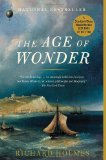Summary | Excerpt | Reviews | Beyond the Book | Readalikes | Genres & Themes | Author Bio
How the Romantic Generation Discovered the Beauty and Terror of Science

Critics' Opinion:
Readers' Opinion:
First Published:
Jul 2009, 576 pages
Paperback:
Mar 2010, 576 pages
 Book Reviewed by:
Book Reviewed by:
Jo Perry
Buy This Book
Chapter 1
Joseph Banks in Paradise 1
On 13 April 1769, young Joseph Banks, official botanist to HM Bark Endeavour, first clapped eyes on the island of Tahiti, 17 degrees South, 149 degrees West. He had been told that this was the location of Paradise: a wonderful idea, although he did not quite believe it.
Banks was twenty-six years old, tall and well-built, with an appealing bramble of dark curls. By temperament he was cheerful, confident and adventurous: a true child of the Enlightenment. Yet he had thoughtful eyes and, at moments, a certain brooding intensity: a premonition of a quite different sensibility, the dreaming inwardness of Romanticism. He did not like to give way to it. So he kept good company with his shipmates, and had carefully maintained his physical fitness throughout the first eight months of the voyage. He regarded himself – ‘thank god’ – as in as good mental and physical trim as a man could be. When occasionally depressed, he did vigorous jumping ‘rope exercises’ in his cabin, once nearly breaking his leg while skipping.
He was capable of working patiently for hours on end in the extremely cramped conditions on board. The quarterdeck cabin, which he shared with his friend Dr Daniel Solander, was approximately eight feet by ten. He had adopted a strict daily routine of botanical drawing, electrical experiments, animal dissections, deck-walking, bird-shooting (when available) and journal-writing. He constantly fished specimens from the sea, shot or netted wild birds, and observed meteorological phenomena, such as the beautiful ‘lunar rainbows’. When his gums had begun bleeding ominously with the onset of scurvy, he had calmly treated himself with a specially pre-prepared syrup (‘Dr Hume’s mixture’) of concentrated lemon juice, taking precisely six ounces a day.2 Within a week he was cured.
Just occasionally young Banks’s scientific enthusiasm turned to explosive impatience. When rudely prevented from carrying out any botanical field trips by the Spanish Consul at Rio de Janeiro, and confined for three weeks to the sweltering ship in the harbour at Rio, he wrote colourfully to a friend at the Royal Society: ‘You have heard of Tantalus in hell, you have heard of the French man laying swaddled in linen between two of his Mistresses both naked using every possible means to excite desire. But you have never heard of a tantalized wretch who has born his situation with less patience than I have done mine. I have cursed, swore, raved, stamped.’3 Banks did however unofficially slip over the side at night to collect wild seeds and plants, a hoard which included the exotic purple bougainvillea.
Once among the Polynesian isles, Banks spent hours at the topgallant masthead, his large form crouched awkwardly in the crow’s nest, looking for landfall beneath the heavy tropical cloudbase. At night the crew would hear distant surf roaring through the dark. Now at last he gazed out at the fabled blue lagoon, the black volcanic sand, and the intriguing palm trees (Linnaeus’s Arecaceae). Above the beach the precipitous hills, dense with dark-green foliage and gleaming with white streams, rose sharply to 7,000 feet. On the naval chart Banks noted that the place was marked, prosaically enough, ‘Port Royal Bay, King George the Third’s Island’. ‘As soon as the anchors were well down the boats were hoisted out and we all went ashore where we were met by some hundreds of the inhabitants whose faces at least gave evident signs that we were not unwelcome guests, tho they at first hardly dare approach us. After a little time they became very familiar. The first who aproachd us came creeping almost on his hands and knees and gave us a green bough the token of peace.’
Taking the hint, all the British shore party pulled down green boughs from the surrounding palm trees and carried them along the beach, waving them like ceremonial parasols. Eventually they were shown an idyllic spot close by a stream, where it was indicated that they could set up camp. The green boughs were thrown down in a great pile on the sand, ‘and thus peace was concluded’. Here the British settlement known as Fort Venus was to be established: ‘We then walkd into the woods followd by the whole train to whom we gave beads and small presents. In this manner we walked for 4 or 5 miles under groves of Cocoa nut and Bread fruit trees loaded with a profusion of fruit and giving the most gratefull shade I have ever experienced. Under these were the habitations of the people most of them without walls. In short the scene we saw was the truest picture of an Arcadia of which we were going to be Kings that the imagination can form.’
Excerpted from The Age of Wonder by Richard Holmes Copyright © 2009 by Richard Holmes. Excerpted by permission of Pantheon, a division of Random House, Inc. All rights reserved. No part of this excerpt may be reproduced or reprinted without permission in writing from the publisher.





The Funeral Cryer by Wenyan Lu
Debut novelist Wenyan Lu brings us this witty yet profound story about one woman's midlife reawakening in contemporary rural China.
Your guide toexceptional books
BookBrowse seeks out and recommends the best in contemporary fiction and nonfiction—books that not only engage and entertain but also deepen our understanding of ourselves and the world around us.